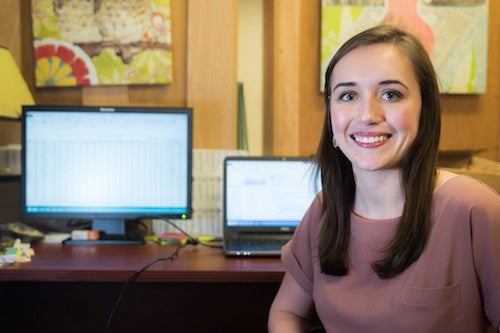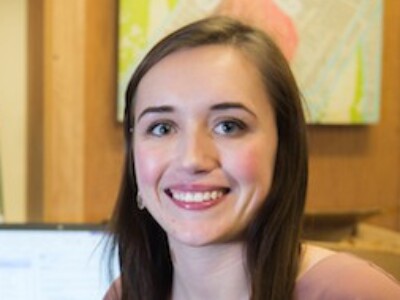Master’s student Meghan Cocking has received a Health Equity Fellowship to assist with an upcoming project focusing on oral health at the Texas Health Institute, where she is a final field intern.

When Cocking is not crunching numbers at the Texas Health Institute, where she mostly assists with data gathering and analysis for public health projects, she is busy in the kitchen baking cakes.
Baking professional cakes – almond is her favorite flavor – is the current iteration of a fascination with cooking, food, and nutrition that blossomed when Cocking was in her teens and became kitchen director of the Bible camp she grew up attending in East-Central Texas.
“I managed the whole kitchen, planned all the menus, took into account food restrictions… I got to cook for 175 kids one time,” she remembers.
“Traditionally camp food is not very healthy, but I like good food and I believe that eating well makes you feel well. So I tried to follow our strict budget but still cook good food for the kids at the camp. They were at camp only for a week, so I was not going to give them diabetes by giving them cookies. But I made sure that they had vegetables!”
During her time at the School of Social Work, Cocking has focused most of her class projects on nutrition and food –for one course, for instance, she created a social media campaign to spread awareness about food deserts.
Through her work at the Texas Health Institute, Cocking has been able to look at nutrition and health from a public health perspective, with which she was unfamiliar before.
“I’ve always known that I was interested in nutrition and health, and in the administration and management side of social work – working with the people that work with the clients. But I never knew that I could be so interested in research. This internship opened my eyes to how we can improve people’s health, sometimes in dramatic ways, but from this very macro level,” Cocking says.
The Office of Minority Health selected Cocking from a national pool of 800 applicants for the Health Equity Fellowship, which support the engagement of emerging health professionals in the design, implementation, and evaluation of policies that reduce health disparities and advance health equity.
“I will be assisting with the creation of an online oral health index at the county level, similar to the County Health Rankins & Roadmaps that you might be familiar with. My role is to systematically compare the indexes that are already available, whether they are related to physical health or oral health, and make recommendations about what our index should look like,” she explains.
After graduating, Cocking says she would love to keep working at the Texas Health Institute.
“The culture of the organization is great, and the mission is very important,” she says. “I love how interdisciplinary the institute is but how at the same time everyone has a social-work, holistic mentality.”


